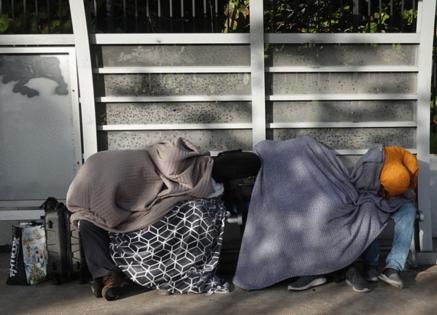Tiny cottages for homeless people could be coming to Florida's Palm Beach County
Published in News & Features
FORT LAUDERDALE, Fla. — Palm Beach County officials are moving forward with a plan to curb homelessness through the introduction of tiny cottages.
Beyond a place to sleep at night, these tiny homes would provide people with a bathroom, shower and kitchen. And in the face of Florida’s new law banning people from sleeping in public spaces such as in parks, bus stops, on the beach and on sidewalks overnight, this may provide a tangible solution, county officials say.
“My job is making sure we have a workable solution to cure homelessness that doesn’t cost the taxpayers any more money,” said Palm Beach County Commissioner Maria Sachs, who has championed the tiny cottages idea.
Palm Beach County would be the latest local government in South Florida exploring the idea of offering that type of housing. Both Broward and Miami-Dade counties this year similarly have explored the idea of setting up some tiny homes.
In a letter, Sachs discussed the County Commission’s decision to adopt the policy, saying that tiny cottages’ construction, even with electrical and sanitation, costs “considerably less” than the use of temporary shelters.
And even still, Sachs said the county is working with South Florida’s Congressional members, such as U.S. Reps. Brian Mast, Lois Frankel and Jared Moskowitz, to retain grants to support the construction of the cottages.
“What my primary interest is as a County Commissioner and as a steward of the taxpayers money is that we don’t spend more money on the homeless. We have been spending a lot of money on trying to help the homeless, but we haven’t cured it,” she said.
Bringing tiny cottages to Palm Beach County
Anyone can go on Amazon at any time and buy an entire ready-to-assemble house, some with multiple bedrooms and stories for between $15,000 and $20,000. Palm Beach County officials may very well go that route.
Sachs said she hasn’t decided yet exactly which methods the county will choose to move forward with, but she’s considering several, from buying them off Amazon to creating 3D-printed homes to collaborating with developers who specialize in tiny homes.
“I’m collecting these (options) to see, first of all, are they concurrent with our Miami building codes? These can’t be RVs or mobile homes, these have to be absolutely secure during the worst hurricanes and flooding,” Sachs said. They also need to cost effective and portable, she said.
Finding areas to build is another challenge in a rapidly growing county where land is becoming increasingly sparse. Also, some neighbors may oppose housing the homeless near their residences.
Sachs wants county officials to tackle the plan by identifying “distressed properties” as potential plots to build on, such as an abandoned dry cleaning factory.
“I have my office working to find lots that are for sale that are industrial commercial areas,” Sachs said. “They call them distressed properties. So they’re relatively inexpensive. And the ones that seem to work the best are lots where you don’t have to knock anything down and clean the soil.”
Housing First
The tiny cottages stem from a broader model dubbed Housing First, which is a “homeless assistance approach that prioritizes providing permanent housing to people experiencing homelessness, thus ending their homelessness and serving as a platform from which they can pursue personal goals and improve their quality of life,” according to the National Alliance to End Homelessness.
This model differs from others in that there are no barriers to entry in receiving housing; rather, having a bed under a roof is seen as the “foundation for life improvement” and then everything else — addressing any behavioral health or addiction problems, for example — follows.
As the cost of living has climbed, Stanford Purnell, the director of Social and Emotional Wellness at the Achievement Centers in Delray Beach, said he has seen homelessness get worse, especially because people who are couch-hopping or sleeping in cars generally are not counted.
A 2024 point-in-time count, which determines how many people are experiencing homelessness on a single day, found that more than 2,000 people were unhoused in Palm Beach County. This is a nearly 15% increase from the 2023 point-in-time count, according to the county’s community services.
Achievement Centers has various programs for low-income children and their parents. Purnell said he believes the tiny cottages will be “really helpful” in getting them into a permanent situation.
“There’s just been a significant increase in housing costs. And I think unfortunately we haven’t seen that same trend in the wages that families are making,” he said.
A new state law
The plan for the tiny cottages was largely spurred by the enactment of the state law that bans Florida’s homeless from sleeping in public spaces.
Purnell worries that people who may be on the cusp of homelessness but don’t qualify for a shelter may have no choice but to find an alternative solution, such as sleeping in their car, but that will no longer be allowed.
“Now they can’t really set up shop anywhere. I feel like a lot of families are going to wind up in this place,” he said.
Sachs didn’t yet have a set timeline for when the county may begin to be dotted with these cottages, but the hope is start seeing them at some point next year.
“Government works slowly. I’m an impatient person,” she said, adding: “This is an issue we have to face. … We will do it with dignity, and we’ll do it without increasing taxes. We will do it because it works, and we’re one community.”
©2024 South Florida Sun Sentinel. Visit at sun-sentinel.com. Distributed by Tribune Content Agency, LLC.







Comments